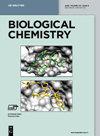18β-glycyrrhetinic acid alleviates radiation-induced skin injury by activating the Nrf2/HO-1 signaling pathway
IF 2.4
4区 生物学
Q3 BIOCHEMISTRY & MOLECULAR BIOLOGY
引用次数: 0
Abstract
Radiation-induced skin injury is a common side effect of radiotherapy, but there are few therapeutic drugs available for prevention or treatment. In this study, we demonstrate that 18β-Glycyrrhetinic acid (18β-GA), a bioactive component derived from18β-甘草次酸通过激活 Nrf2/HO-1 信号通路减轻辐射引起的皮肤损伤
放疗引起的皮肤损伤是放疗的常见副作用,但目前几乎没有治疗药物可用于预防或治疗。在这项研究中,我们证明了从甘草中提取的生物活性成分 18β-Glycyrrhetinic acid(18β-GA)能显著减少电离辐射(IR)后活性氧(ROS)的积累并抑制 HaCaT 细胞的凋亡,从而减轻辐射诱导的皮肤损伤。从机理上讲,18β-GA 可促进 Nrf2 的核导入,从而激活 Nrf2/HO-1 信号通路以应对 IR。重要的是,沉默 Nrf2 会增加细胞凋亡,并逆转 18β-GA 对辐射诱导的皮肤损伤的保护作用。此外,18β-GA 还能保护辐照后的皮肤组织结构,抑制炎症细胞浸润,缓解放射性皮炎。总之,我们的研究结果表明,18β-GA 可通过激活 Nrf2/HO-1 信号通路减少细胞内 ROS 的产生和细胞凋亡,从而改善辐射性皮炎。
本文章由计算机程序翻译,如有差异,请以英文原文为准。
求助全文
约1分钟内获得全文
求助全文
来源期刊

Biological Chemistry
生物-生化与分子生物学
CiteScore
7.20
自引率
0.00%
发文量
63
审稿时长
4-8 weeks
期刊介绍:
Biological Chemistry keeps you up-to-date with all new developments in the molecular life sciences. In addition to original research reports, authoritative reviews written by leading researchers in the field keep you informed about the latest advances in the molecular life sciences. Rapid, yet rigorous reviewing ensures fast access to recent research results of exceptional significance in the biological sciences. Papers are published in a "Just Accepted" format within approx.72 hours of acceptance.
 求助内容:
求助内容: 应助结果提醒方式:
应助结果提醒方式:


